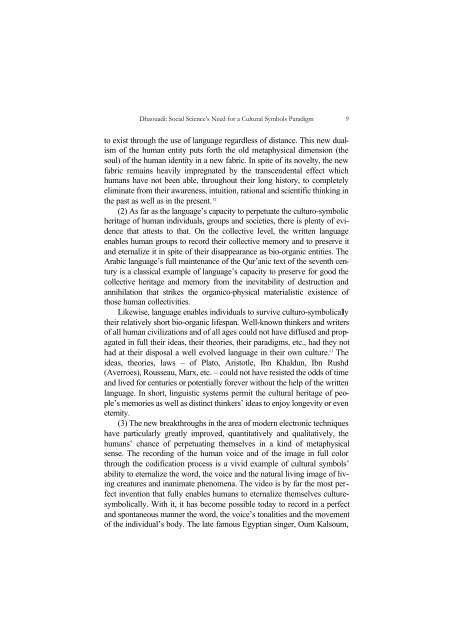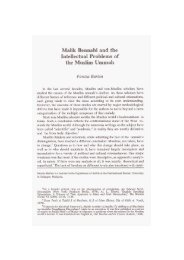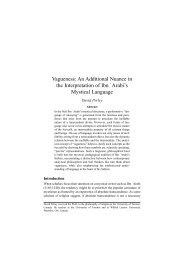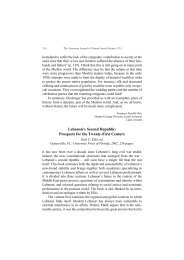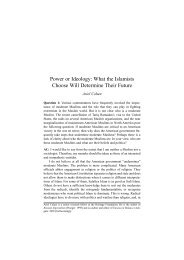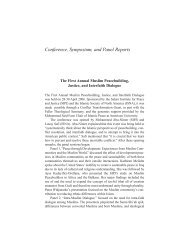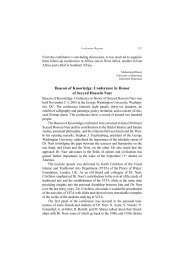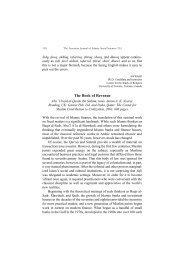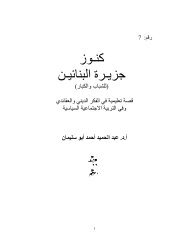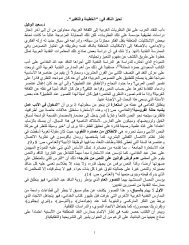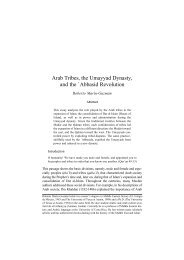Social Science's Need for a Cultural Symbols ... - Epistemology
Social Science's Need for a Cultural Symbols ... - Epistemology
Social Science's Need for a Cultural Symbols ... - Epistemology
You also want an ePaper? Increase the reach of your titles
YUMPU automatically turns print PDFs into web optimized ePapers that Google loves.
Dhaouadi: <strong>Social</strong> Science’s <strong>Need</strong> <strong>for</strong> a <strong>Cultural</strong> <strong>Symbols</strong> Paradigm 9<br />
to exist through the use of language regardless of distance. This new dualism<br />
of the human entity puts <strong>for</strong>th the old metaphysical dimension (the<br />
soul) of the human identity in a new fabric. In spite of its novelty, the new<br />
fabric remains heavily impregnated by the transcendental effect which<br />
humans have not been able, throughout their long history, to completely<br />
eliminate from their awareness, intuition, rational and scientific thinking in<br />
the past as well as in the present. 12<br />
(2) As far as the language’s capacity to perpetuate the culturo-symbolic<br />
heritage of human individuals, groups and societies, there is plenty of evidence<br />
that attests to that. On the collective level, the written language<br />
enables human groups to record their collective memory and to preserve it<br />
and eternalize it in spite of their disappearance as bio-organic entities. The<br />
Arabic language’s full maintenance of the Qur’anic text of the seventh century<br />
is a classical example of language’s capacity to preserve <strong>for</strong> good the<br />
collective heritage and memory from the inevitability of destruction and<br />
annihilation that strikes the organico-physical materialistic existence of<br />
those human collectivities.<br />
Likewise, language enables individuals to survive culturo-symbolically<br />
their relatively short bio-organic lifespan. Well-known thinkers and writers<br />
of all human civilizations and of all ages could not have diffused and propagated<br />
in full their ideas, their theories, their paradigms, etc., had they not<br />
had at their disposal a well evolved language in their own culture. 13 The<br />
ideas, theories, laws – of Plato, Aristotle, Ibn Khaldun, Ibn Rushd<br />
(Averroes), Rousseau, Marx, etc. – could not have resisted the odds of time<br />
and lived <strong>for</strong> centuries or potentially <strong>for</strong>ever without the help of the written<br />
language. In short, linguistic systems permit the cultural heritage of people’s<br />
memories as well as distinct thinkers’ ideas to enjoy longevity or even<br />
eternity.<br />
(3) The new breakthroughs in the area of modern electronic techniques<br />
have particularly greatly improved, quantitatively and qualitatively, the<br />
humans’ chance of perpetuating themselves in a kind of metaphysical<br />
sense. The recording of the human voice and of the image in full color<br />
through the codification process is a vivid example of cultural symbols’<br />
ability to eternalize the word, the voice and the natural living image of living<br />
creatures and inanimate phenomena. The video is by far the most perfect<br />
invention that fully enables humans to eternalize themselves culturesymbolically.<br />
With it, it has become possible today to record in a perfect<br />
and spontaneous manner the word, the voice’s tonalities and the movement<br />
of the individual’s body. The late famous Egyptian singer, Oum Kalsoum,


